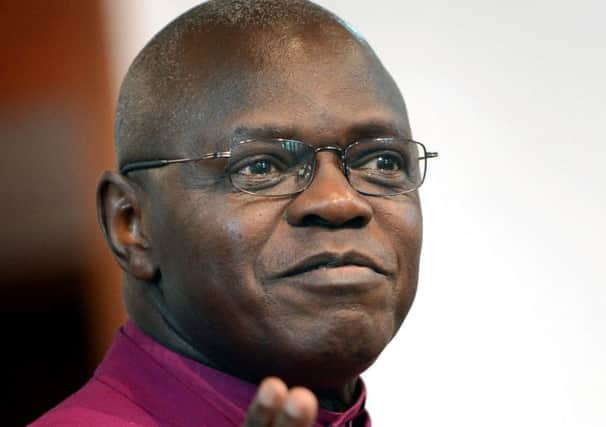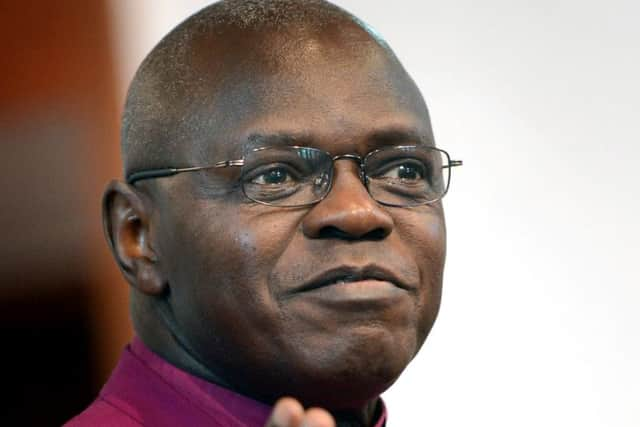Sentamu: My shame over cathedral child sex scandal


Dr John Sentamu was responding to a report published today into the handling of allegations of sex abuse against the late Robert Waddington, formerly Dean of Manchester, which found there were “systemic failures” by the Church.
Dr Sentamu’s predecessor as Archbishop, Lord Hope of Thornes, has been accused of failing to act on information he received.
Advertisement
Hide AdAdvertisement
Hide AdToday’s report, by Judge Sally Cahill QC, found that: “Our conclusion, having heard his (Lord Hope’s) evidence is that his concern for the welfare of Robert Waddington seems to have been paramount in his response to these allegations.”


Lord Hope has said he is “disappointed” that the report has raised concerns about how the cases were handled and denied that there was a cover-up.
Responding to the report, Dr Sentamu said: “I have already been in contact with those who gave evidence to the inquiry regarding their alleged abuse by Robert Waddington.
“As I have said to them, I am deeply ashamed that the Church was not vigilant enough too ensure that these things did not happen, failing both to watch and to act, where children were at serious risk.”
Advertisement
Hide AdAdvertisement
Hide AdDr Sentamu added that he had “every sympathy” with the view expressed by one victim that admissions of abuse made during confessional should no longer be confidential.
For centuries the secrecy of the confessional has been sacrosanct, but it was reported in September that the Church of England may relax the rules to allow clergy to reveal serious crimes such as child abuse.
Former Bishop of Chelmsford John Gladwin, who last year led an inquiry into clerical sex abuse in the Church of England, is pressing for the changes, along with members of the Church’s ‘parliament’, the General Synod.
Dr Sentamu said in his report that “one of those who reported abuse to the inquiry has since asked me specifically to raise the question of The Confessional.”
Advertisement
Hide AdAdvertisement
Hide AdHe added: “His view is that disclosures made in the context of a formal Confession which give rise to safeguarding concerns should not enjoy absolute confidentiality.
“I have every sympathy with this view, and therefore welcome the fact that that Archbishops’ Council has decided to commission theological and legal work with a view to exploring whether the current position in relation to admissions of abuse in the context of a formal Confession should be changed.
“That work and any recommendations arising from it will need to be discussed with the House of Bishops before any proposals for change are brought before the General Synod.”
The Archbishop said he accepted the report’s conclusion that “irrespective of policies in force there was a systemic failure”.
Advertisement
Hide AdAdvertisement
Hide AdHe said: “Although the report notes no-one has come forward to say they were abused by Robert Waddington after the first complaint was made in 1999, what stands out is that between 1999 and 2004 those in senior positions responsible for taking decisions in these matters were ‘not qualified or sufficiently experienced in child protection’.”
Lord Hope has denied suggestions he covered-up allegations against the Very Rev Waddington, who died from cancer in 2007.
Today, he said: “I have maintained throughout my career that any allegation of abuse made against anyone connected to the Church must be dealt with professionally and swiftly.
“Accordingly, I am obviously disappointed that this inquiry has raised concerns about how the two cases in questions were dealt with during my time at Bishopthorpe (Palace – seat of the Archbishop of York).”
Advertisement
Hide AdAdvertisement
Hide AdLord Hope said that when allegations were reported to him 15 and 12 years ago they were “unspecific” and he has never been told the full details.
He said there was no recommendation at that time that allegations should be reported to the police and he was told the complainant would not talk to officers.
The former Archbishop withdrew Waddington’s permission to act as a priest in 2004.
He said: “Last May, in some of the reporting, it was suggested that there had been some cover-up by me.
Advertisement
Hide AdAdvertisement
Hide Ad“This report makes clear that not applying the policy is not the same as a cover-up.
“Hindsight is, of course, a wonderful thing.
“If all that has been learned by organisations and the public about child abuse in the last 15 years had been known in 1999 and 2004 I would certainly have acted differently.”
Lord Hope said: “If either of the two persons concerned feel in the light of this report they have been denied the justice they deserve then, on behalf of the Church, I offer my personal and profound apology.
“I genuinely believed that any complaints were being adequately dealt with by the respective dioceses in which they were alleged to have happened.”
Advertisement
Hide AdAdvertisement
Hide AdJudge Cahill made it clear in her report it was not within her remit to decide on the truth of any of the allegations against Waddington.
Those who made allegations described abuse in Manchester, York, London, Carlisle and in Queensland, Australia dating back as far as the 1950s.
One man alleges he was abused when Waddington was assistant curate at St John’s, Bethnal Green, London, some time between 1953 and 1955.
He told the investigators the abuse started during confirmation classes and how he called him “mon petit”.
Advertisement
Hide AdAdvertisement
Hide AdIn 1961 Waddington was made headmaster at St Barnabas School, Ravenshoe, Queensland, where more alleged abuse took place.
He returned to the UK in 1971 and eventually became Dean of Manchester between 1984 and 1993.
The report said Eli Ward joined the choir at Manchester Cathedral in 1980, when he was eight, and got to know Waddington well.
“Over the next few years from the age of about 11 or 12 he was a regular visitor at Robert Waddington’s home,” the judge said.
Advertisement
Hide AdAdvertisement
Hide Ad“Robert Waddington took him there in the car. He says he was abused by Robert Waddington. He did not tell anyone at the time.”
Waddington retired to York where he continued to take services at The Minster until 2003 and at other churches in the area until 2004.
The report said: “We, like the Minster staff, cannot categorically state that Robert Waddington would not have had access to children during these services but we accept it is not likely.”
Other complainants came forward once the initial allegation became public.
Advertisement
Hide AdAdvertisement
Hide AdThe report said: “The common account we have is that Robert Waddington invited choir boys, three in particular, to go to York to stay with him, intially two at a time, but then on their own.”
The report said a number of files on Waddington refer to him in positive terms, with one from 1955 saying: “He has a special gift with boys.”
One of Waddington’s victims, Eli Ward, who has waived his right to anonymity, said his abuser was a “very clever guy”.
Describing how he was groomed, he told BBC News: “It would progress to picking me up, go to his house, stay over and then stay in his room and so on.
Advertisement
Hide AdAdvertisement
Hide Ad“Over a period of time, little by little, very strategic planning, very clever guy, peeling away his victim ... not just an opportunity - take it, it’s very much insidious, planning and grooming, very clever.”
Responding to the report, he said: “I want no other child, person, to go through what I have gone through.
“I have been through the full range of emotions - that’s terrible, disgraceful. I should have been enjoying life, getting on with it - my abuse has stopped me doing that.”
In his statement, the Bishop of Manchester, Dr David Walker, said that a “more vigorous and co-ordinated approach” by the dioceses involved might have seen Waddington brought to justice for his crimes in his lifetime.
Advertisement
Hide AdAdvertisement
Hide AdHe said: “Robert Waddington abused children. He abused them in Australia and in England. He exploited the trust placed in him, first as a teacher and then as a priest, to gain repeated and unsupervised access to the children he abused.
“My heart goes out to those whose lives have been irreparably damaged by what Robert Waddington did to them. When I read of the ongoing effects of his abuse, decades after it took place, it makes my blood run cold.”